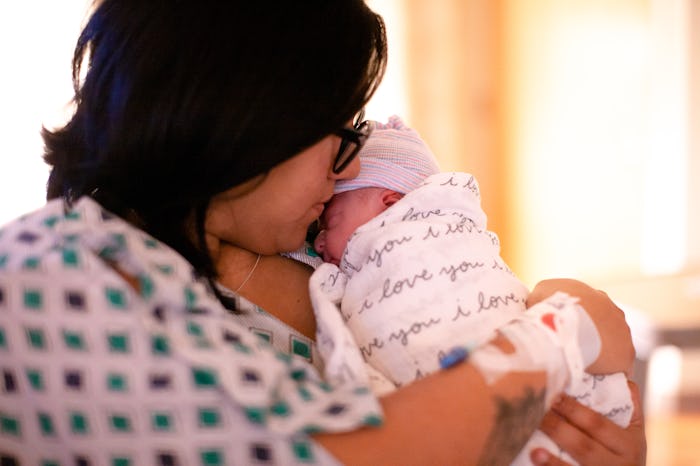Postpartum

Here's The Deal With Pesky Postpartum Rashes
Got an itch?
“What the... ?” Those are the typical words uttered when you spot a rash on your body. Seemingly out of nowhere, a flair up can come as a big surprise. The timing is never great, but when you’re in postpartum recovery mode, it’s especially inconvenient. You’ve got a tiny human to care for. You don't have time to itch, let alone deal with angry red bumps all over your body. What is it? Postpartum rash, that’s what.
What Is Postpartum Rash?
Postpartum is a rash you experience during the postpartum period.
“There are different types of rashes that can come up during both pregnancy and postpartum,” says Dr. Nisha Verma, an OB/GYN and abortion care provider as well as Darney-Landy Fellow in The American College of Obstetricians and Gynecologists Strategies for Health Equity department. “For example, we’ll see cholestasis of pregnancy, which tends to cause an itchiness. It tends to be related to the gallbladder not digesting bile acids properly.” There are also rashes like contact dermatitis, a red itchy rash that’s typically in response to an allergy.
In fact, even the dressings on c-section incisions can cause a rash, Dr. Verma says. “Often people will get the same things they get outside of pregnancy like eczema,” Dr. Verma adds.
Postpartum Rash Symptoms
The symptoms for postpartum rash will vary depending on what you contract, however, you can generally expect itchiness and irritation and often that’s accompanied by red swelling.
The spectrum of swelling varies in extremes. For instance, PUPPP, pruritic urticarial papules and plaques of pregnancy, is a bumpy rash that extends across stretch marks on the abdomen. It can begin in the third trimester and continue into postpartum. The benign inflammatory skin disorder, while uncomfortable and visually disconcerting, is easily treatable, and will eventually go away, according to PubMed.
Causes of Postpartum Rash
As mentioned earlier, like all skin disorders, rashes during postpartum can be triggered by a number of factors, from diet to medications to hormones. But if and when you’ll get a postpartum rash isn’t necessarily something you can plan for.
However, if you have suffered from eczema in the past or have known skin allergies, Dr. Verma says it’s best to let your care providers know during and after your pregnancy.
Treatment For Postpartum Rash
Depending on the severity of the rash, Dr. Verma says you should seek medical help. “You can just snap a picture of the rash and send it to your provider and they’ll be able to help,” she says. If you have just a minor itch, over the counter treatments might be enough, but she says if it persists or has you more concerned, the best solution is to seek medical treatment to get you fast relief.
Postpartum rashes can make caring for yourself and your baby difficult. When in doubt, call your doctor.
Expert
Dr. Nisha Verma, an OB/GYN and abortion care provider and Darney-Landy ACOG fellow
Studies
Chouk C, Litaiem N. Pruritic Urticarial Papules And Plaques Of Pregnancy. [Updated 2021 Aug 6]. In: StatPearls [Internet]. Treasure Island (FL): StatPearls Publishing; 2022 Jan-. Available from: https://www.ncbi.nlm.nih.gov/books/NBK539700/
This article was originally published on